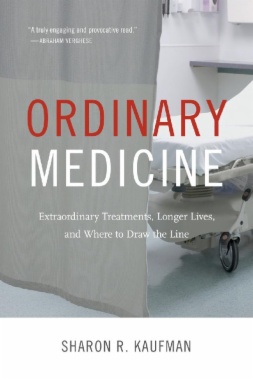Most of us want and expect medicine’s miracles to extend our lives. In today’s aging society, however, the line between life-giving therapies and too much treatment is hard to see—it’s being obscured by a perfect storm created by the pharmaceutical and biomedical industries, along with insurance companies. In Ordinary Medicine Sharon R. Kaufman investigates what drives that storm’s “more is better” approach to medicine: a nearly invisible chain of social, economic, and bureaucratic forces that has made once-extraordinary treatments seem ordinary, necessary, and desirable. Since 2002 Kaufman has listened to hundreds of older patients, their physicians and family members express their hopes, fears, and reasoning as they faced the line between enough and too much intervention. Their stories anchor Ordinary Medicine. Today’s medicine, Kaufman contends, shapes nearly every American’s experience of growing older, and ultimately medicine is undermining its own ability to function as a social good. Kaufman’s careful mapping of the sources of our health care dilemmas should make it far easier to rethink and renew medicine’s goals.
- Cover
- Contents
- Acknowledgments
- Introduction: Diagnosing Twenty-First-Century Health Care
- Part I: The Quandary and Unexamined Ordinariness of Twenty-First-Century Medicine
- 1. Ordinary Medicine in Our Aging Society: The Dilemma of Longevity
- Part II: The Chain of Health Care Drivers
- 2. The Medical-Industrial Complex I: Evidence-Based Medicine, the Biomedical Economy, and the Ascendance of Clinical Trials
- 3. The Medical-Industrial Complex II: Access, Industry, and the Clinical Trials Phenomenon
- 4. “Reimbursement Is Critical for Everything” Medicare and the Ethics of Managing Life
- Part III: Medicine’s Changing Means and Ends
- 5. Standard and Necessary Treatments: The Changing Means and Ends of Technology
- 6. Family Matters: Kidneys and New Forms of Care
- 7. Influencing the Character of the Future: Prognosis, Risk, and Time Left
- 8. For Whose Benefit? Our Shared Quandary
- Conclusion: Toward a New Social Contract?
- Notes on the Research
- Notes
- Bibliography
- Index

